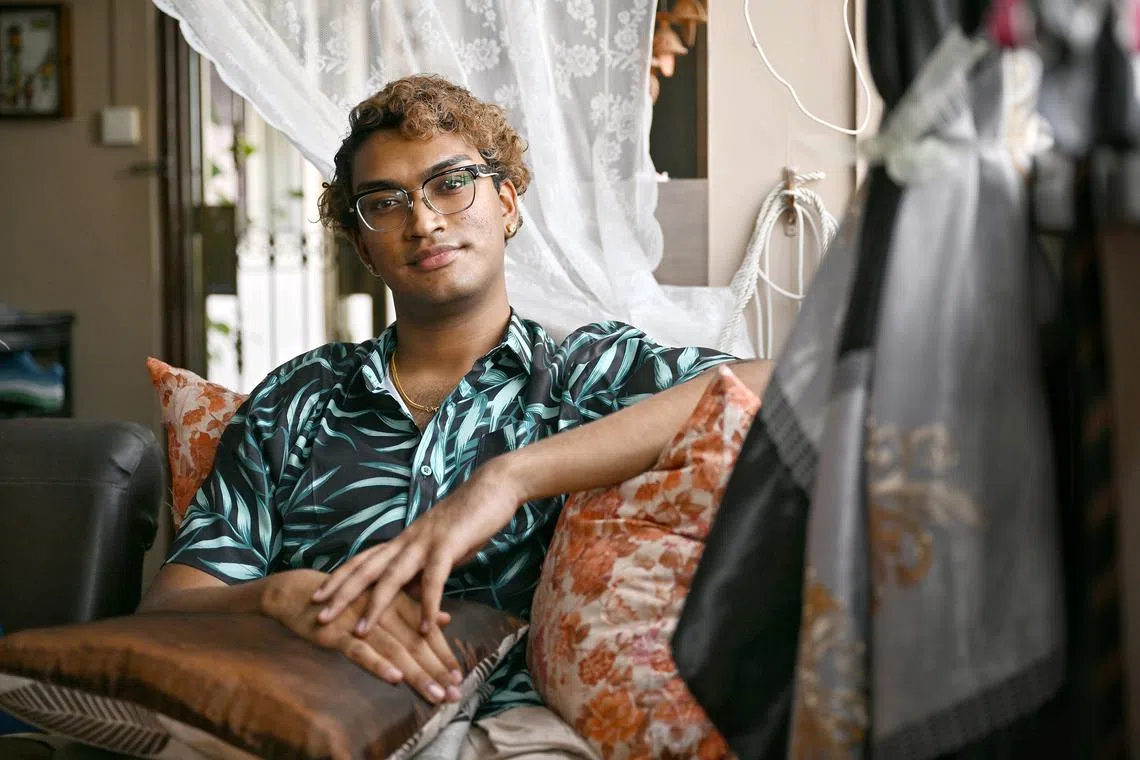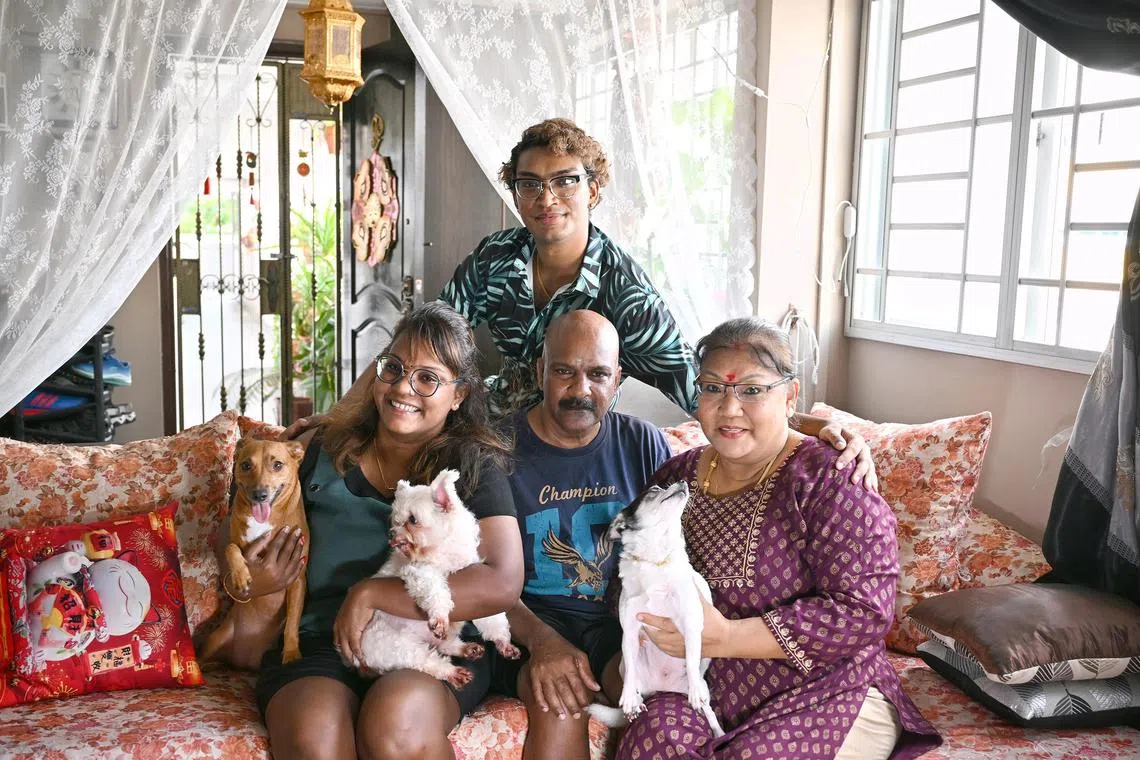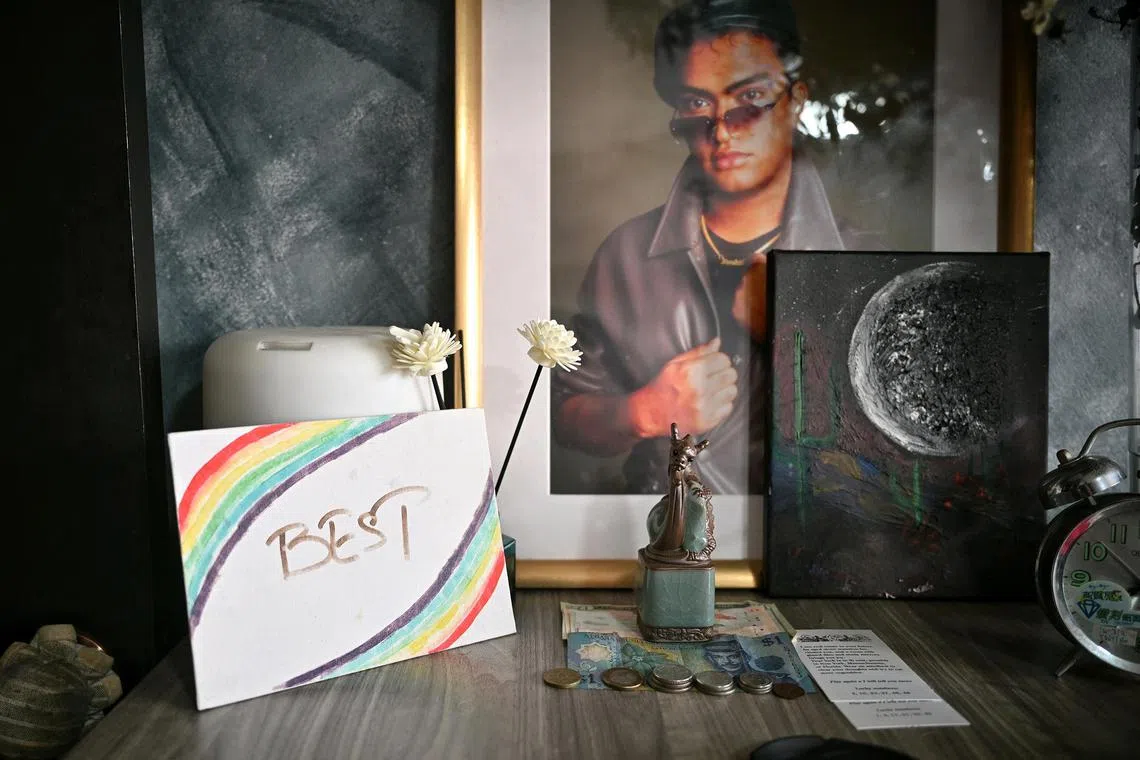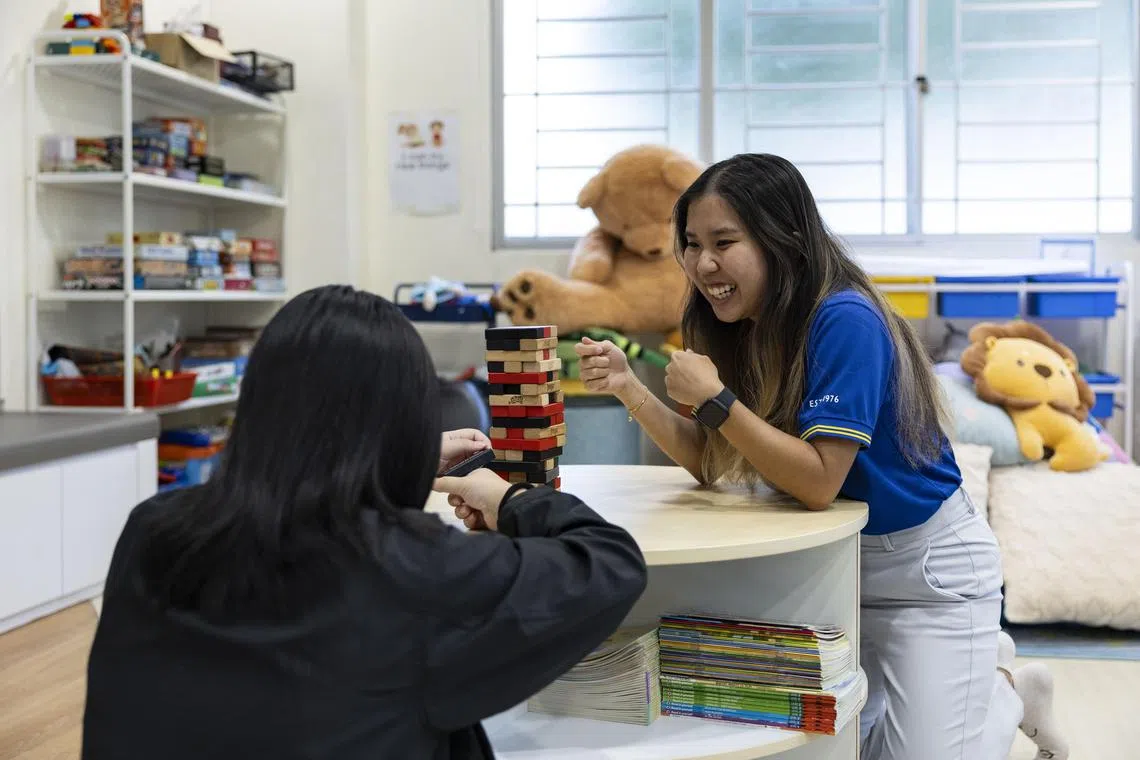No health without mental health
Teen struggled for more than a year – not understanding he was depressed
Sign up now: Get ST's newsletters delivered to your inbox

Mr Reshiivarma was diagnosed with severe anxiety and depression in mid-2020.
ST PHOTO: ARIFFIN JAMAR
Follow topic:
SINGAPORE - In the kitchen of Mr Reshiivarma’s family home, there used to be a small space between the dining table and the washing machine that he would often retreat to after school.
Those dark days, beginning in late 2018, never seemed to end.
His mother, Madam Krishnaveni, would often find him hiding there – her once-cheerful son swaddled in a thickening fog of sadness.
The then 18-year-old student at the Institute of Technical Education (ITE) would say little, except to tell her from time to time: “I want to die, I want to die.”
His family could not comprehend his despair. It was only several months later that he revealed to his mother that he had been bullied since he was in secondary school and now at work, and was struggling to cope.
But for more than a year, he did not get help because neither he nor his parents knew how truly affected he was.
Mr Reshii’s story points to a broader reality. In 2023, the National University of Singapore Youth Epidemiology and Resilience study found that only about one in 10 parents observed mental health symptoms in their children, even though one in three adolescents aged 10 to 18 reported such symptoms to the survey.
Youth mental health has been in the spotlight in recent years, with a significant number of young people affected by not just traditional stressors like academic stress, but also new risks like cyber bullying and social media addiction.
Mr Reshii’s family thought he was stressed, like any other young person in school. His sister, a decade older, was working overseas, so it was just him at home with his parents, who told him not to be so hard on himself.
In the beginning, he too wondered why he was coping so badly.
“I just felt overwhelmed by everything: school, work, and trying to live up to societal expectations. I had always been a high achiever, and I thought that was normal for me. But as the pressure built, I started to feel like I was drowning,” said Mr Reshii, now 24.
“Some days, I wished a car would just hit me... so that I would not feel so much pain in my head,” he said.
It was hard for his father, Mr Valamuthu, to understand what was happening. He wondered why his son was so stressed as a teenager with few cares. What was he trying to prove, he thought?
But Mr Muthu, 61, slowly started to accept that something was not right with his son, after his 21-year-old nephew, who had been grappling with depression, took his own life in early 2019.
At around the same time, two of Mr Reshii’s friends died by suicide.
“People started saying bad things about the family. They also said that the person who died is a coward,” Mr Reshii said.

Mr Reshii with his father Valamuthu, mother Krishnaveni and sister Thiruniraiselvi.
ST PHOTO: ARIFFIN JAMAR
He saw how the suicides changed the families involved, and became afraid to think about dying. “I did not want my family to be embarrassed because of me. I did not want to traumatise the people who will have to pick up my dead body,” he said.
After doing some research, he realised that he might have anxiety and depression.
“One night, I broke down in front of my family. That moment was hard, but it opened the door to seeking help,” he said.
The next day, he and his mother went to the nearest polyclinic, where he was referred to a psychiatrist and a psychologist at the nearby hospital. In mid-2020, he was diagnosed with severe anxiety and depression.
His mounting stressors
Mr Reshii had always been a lively child who wanted to do well and please others.
Diagnosed with dyslexia at nine, he attended educational programmes and had speech therapy till the age of 15. But he felt ashamed and did not tell his friends about his learning challenges, hoping that no one would ever find out.
At ITE, he pushed himself hard, attaining a GPA of 3.7 and taking on three co-curricular activities. He would arrive at school early, and go to work after class, on most days of the week.
But during an internship at a restaurant in 2018, he faced persistent criticism, which left him emotionally battered. His colleagues would yell and hurl vulgarities at him.
The supervisor told him that abusive talk was the universal language of the food and beverage industry.
“I bottled it up, thinking I could handle it, but eventually, it all became too much,” he said.

Mr Reshii has a card placed on his dresser that helped him through tough times.
ST PHOTO: ARIFFIN JAMAR
After things came to a head and he broke down in front of his parents, he started going for therapy regularly.
In 2020, during a session, he became emotional while talking to his psychologist about suicidal thoughts and was taken by ambulance to the Institute of Mental Health.
His mother did not want him to be admitted and said she would care for him at home, where she locked all the window grilles of their flat.
But one night in 2021, he went out without telling his mother and did not come back till past 1am.
When it happened again the next day, Madam Krishnaveni took action. “I was so scared, I took a chain, chained everything and locked everything. The whole night... I sat outside the door of his room,” said the 60-year-old.
The next morning, her son got up and went to work.
She said her fear of her son wanting to harm himself started to dissipate only in early 2023, when she felt that he was managing his stress well.
“Until now, I still talk to him. I say, ‘Boy, you must think... If you have any problem, Mummy is over here to listen to you. Mummy will help you,’” she said.
Experts say a major stumbling block for parents is the invisible nature of mental distress or disorders, but there is overwhelming evidence that points to parents playing a key role in supporting their children’s mental health.
The growing crisis in youth mental health is not lost on the Government, which committed to building up a network of first-stop touchpoints for young people, known as Youth Community Outreach Teams (Crest-Youth).
The Ministry of Health said young people can also consult their general practitioner, who will collaborate with Community Intervention Teams (Comit) to provide needs assessment, psycho-social therapeutic intervention, counselling and education, in addition to medical treatment.
As at August 2024, there were 10 Crest teams and four Comit teams catering to young people. By 2030, there will be 15 each.
A social worker with a Crest-Youth team at social service agency Shine Children and Youth Services, Ms Tan Yi Lin, 25, said parents play a crucial role in supporting their children’s mental health.

Ms Tan Yi Lin is a social worker with a Crest-Youth team at social service agency Shine Children and Youth Services.
ST PHOTO: BRIAN TEO
The agency’s assistant director, Mr Eric Sng, said conversations between parents and their children are becoming more informed and nuanced. There are fewer false attributions of the next generation being “mentally weaker”, and more accurate descriptions of the complex stressors they face in a highly competitive environment.
Recovering from anxiety and depression
Mr Reshii says he is learning how not to let things overwhelm him.
“Letting go of the need to be perfect has been my greatest challenge. For most of my life, I felt like I had to constantly prove my worth through achievements. I’ve learnt that perfection isn’t sustainable – it leads to burnout,” he said.
“One tip that has helped me is setting small, realistic goals. Instead of trying to do everything at once, I break things down into manageable tasks, and I allow myself to rest when I need it. It’s important to remember that it’s okay to prioritise yourself.”
He took up a diploma in psychology in 2022 and is now working towards a bachelor’s degree in criminology and psychology at a private university.
He also works as a hearing manager at social enterprise Hush TeaBar, which organises sessions that promote mental wellness and social inclusion.
“My routine plays a big role in keeping me balanced. I walk my dogs every day, and it’s not just about exercise – it’s a way for me to clear my head and be present.”
He also keeps a journal to reflect on his feelings and track his progress.

His parents, too, have learnt a lot about mental health, as they made the effort to understand and support him, he said.
“They had a traditional upbringing where no one talks about mental health, so it’s very brave of them to want to talk about it publicly and share in my journey. I am very proud of them.”
And that space in the kitchen? It now holds a storage rack.
Helplines
Mental well-being
Institute of Mental Health’s Mental Health Helpline: 6389-2222 (24 hours)
Samaritans of Singapore: 1-767 (24 hours) / 9151-1767 (24-hour CareText via WhatsApp)
Singapore Association for Mental Health: 1800-283-7019
Silver Ribbon Singapore: 6386-1928
Tinkle Friend: 1800-274-4788
Chat, Centre of Excellence for Youth Mental Health: 6493-6500/1
Women’s Helpline (Aware): 1800-777-5555 (weekdays, 10am to 6pm)
Counselling
Touchline (Counselling): 1800-377-2252
Touch Care Line (for caregivers): 6804-6555
Care Corner Counselling Centre: 6353-1180
Counselling and Care Centre: 6536-6366
We Care Community Services: 3165-8017
Online resources
carey.carecorner.org.sg
(for those aged 13 to 25)limitless.sg/talk
(for those aged 12 to 25)


